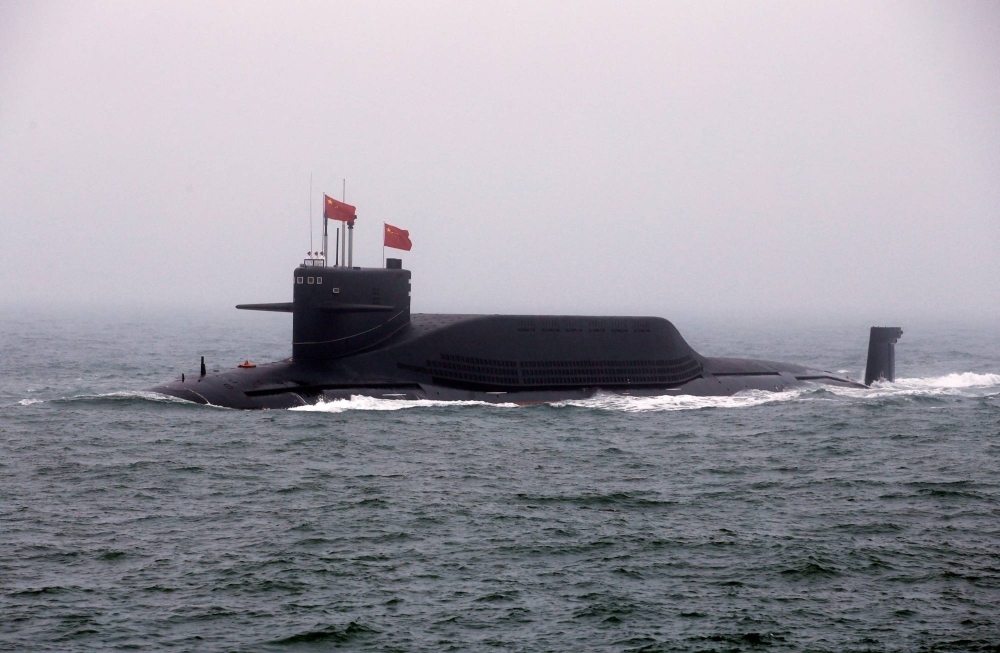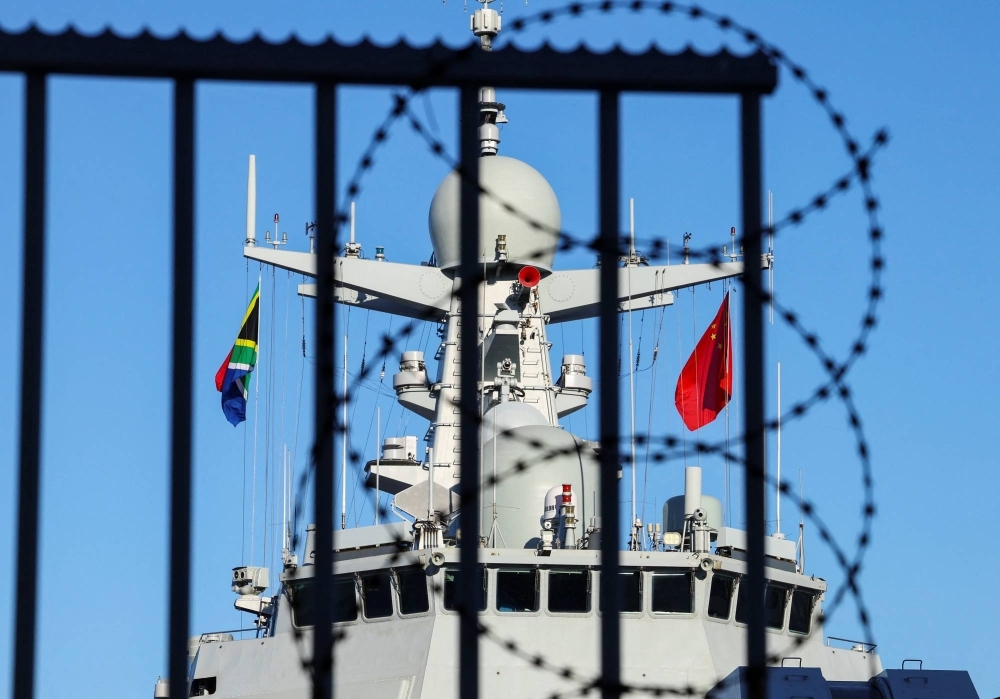As China ups the ante near Taiwan with military exercises designed to encircle the self-ruled island, Beijing may not have an invasion on its mind but rather another approach: a blockade.
The People’s Liberation Army’s (PLA) increasingly frequent exercises around Taiwan, particularly its long-range deployments in the Pacific, indicate that Beijing is refining a strategy to cut the island off from the outside world and keep Taipei’s potential military partners at bay.
“China likely has the capabilities to conduct an aerial and naval blockade per what we know of their military capabilities, force structure and the military exercises we’ve seen them undertake in the past year,” said Kristen Gunness, a security expert and senior policy researcher at the U.S.-based Rand Corp.
Some Chinese coastal air-defense systems can already reach the Taiwan Strait, while the PLA Air Force’s KJ-500 early warning and control aircraft (China’s version of the U.S. AWACS) and the PLA Navy’s Type 052C/D (China’s version of the Aegis destroyer) have the capability to establish a no-fly zone near the eastern coast of Taiwan to prevent other aircraft from entering, said Masashi Murano, a Japan Chair fellow at the U.S.-based Hudson Institute think tank.
But even with China’s growing military capabilities, some officials in Washington argue that a blockade would ultimately fail, since it would give a U.S.-led coalition time to build up enough forces to counter such a move.
Others, such as Ely Ratner, the Pentagon’s top official for Asia, say that Taiwan would still have “options on its own and with the international community to ensure the delivery of industrial resources, raw materials, energy and other critical items” in the event of a blockade.
Defense experts, however, say the issue is more complex.
While giving the U.S. and others time to respond is certainly the main drawback of a blockade from China’s perspective, Beijing still has the advantage of proximity, giving it an array of options to attempt to prevent supplies from arriving, even during a protracted conflict.
More precisely, the experts argue that while Taiwanese and U.S.-led forces could ultimately defeat the PLA Navy and its efforts to stop shipping off Taiwan’s east coast, they could still struggle to resupply the island.
“Yes, the U.S. and its allies could sink China’s navy, but that doesn’t get cargo into Taiwan,” said Lonnie Henley, a former senior U.S. defense intelligence analyst on China who is currently a senior fellow at the Foreign Policy Research Institute.
This is because other PLA branches, including the air and Rocket Forces, could still attack any aircraft or vessel attempting to reach the island and subject all possible ports and landing strips to repeated bombardment.
“The PLA could seal Taiwan’s west coast ports indefinitely while making it extremely difficult for Taipei’s partners to push enough materiel through east coast ports to keep the island alive,” Henley said.
A Chinese encirclement of Taiwan is likely to be different from blockades in the past for a number of reasons, including the geopolitical context, advances in military technology and especially Taiwan’s geographical proximity to the mainland.
A key difference, said Tom Shugart, a former U.S. Navy submarine commander now with the Center for a New American Security think tank, is that Taiwan is only recognized as a sovereign nation by a handful of countries, mostly small states. As a result, Beijing is likely to claim that a blockade — which China would probably call a quarantine, as a blockade is an act of war against a sovereign country — is a domestic action not subject to international law.

How exactly a Taiwan blockade might unfold and which assets would be used to enforce it would ultimately depend on Beijing’s political and strategic aims.
“A blockade could take many forms and impose different levels of hardship on Taiwan, as it can be tailored to the perceived provocation,” said James Schoff, senior director of the U.S.-Japan NEXT Alliance Initiative at the Sasakawa Peace Foundation USA.
While some types of a blockade might not trigger a major mobilization of allied support for Taiwan, others could go on for so long that it would be hard for the U.S. and others to sustain any response.
One possibility would be for China to conduct a “soft or limited blockade” that would allow it to control the air and maritime space around Taiwan using forces it has already largely deployed to the area, including paramilitary forces.
In seeking to coerce Taipei to change its behavior to ways more palatable to Beijing, this type of blockade could be carried out by the China Coast Guard under the guise of repeated or extended military exercises or law enforcement activities that require temporary closure of certain trade routes.
The goal would be to create uncertainty in the area that would either prompt commercial vessels to avoid Taiwan or cause insurance costs to rise, making it financially unattractive to risk sending ships there.
“Such a blockade would not cut Taiwan off completely but would allow China to largely control what goes into or out of the island,” Gunness said.
By not implementing a full blockade, the burden of escalation — in China’s view — would fall on either Taipei or Washington, she added.
The Chinese could also launch a blockade as a prelude to an invasion, in an effort to gain partial superiority over the air, maritime and information arenas to facilitate subsequent landing operations.

The Chinese Navy’s Nanning destroyer visits Cape Town, South Africa, on July 25. | REUTERS
Unlike the first option, this type of blockade would probably involve the use of force, as Chinese invasion preparations would likely be noticeable months in advance.
A third possible course of action would be to forego the invasion and impose the tightest blockade possible to cut Taiwan off until it submits or collapses, in a test of the resilience and fortitude of the island’s nearly 24 million residents.
This drawn-out strategy — designed to compel unification — would be the riskiest for China as it would give friends of Taiwan time to work out ways to defeat a blockade.
In the event of a failed invasion or key naval defeat, China could also resort to a blockade as a fallback option, since Taiwan would still require a large number of supplies.
“That means that U.S. forces must get cargo ships into the west coast ports on a regular basis, in the face of extensive mining and hostile fire, close to China and under conditions of Chinese air superiority,” Henley said, noting that Beijing could resort to using long-range missiles, fighter aircraft as well as patrol boats with missiles and torpedoes to prevent the island from being resupplied.
Henley believes that unless U.S. and allied forces were able to dismantle the PLA’s integrated air-defense system, China could sustain such a blockade for months if not years without exhausting its inventory of air-to-air or surface-to-air weapons.
Penetrating a prolonged blockade — by escorting supply ships — and keeping Taiwan alive “would require a serious U.S. investment in systems and operational concepts” that Washington currently does not have, he said.
Depending on whether China wants to avoid a larger conflict, there might be room to negotiate the movement of particular goods for humanitarian purposes. Alternatively, the U.S. could try to impose a counterblockade of China, sealing off its access to international markets, particularly its access to imported fuels, disrupting its foreign trade and dealing a massive blow to its economy.
Another option would be to establish a humanitarian air and sea corridor off Taiwan’s east coast — though this is the area where fighting would most likely erupt should diplomacy fail.
Experts, however, believe that if Beijing decides to engage in a conflict over Taiwan, it is because it has consciously accepted that it might have to pay a high price.
